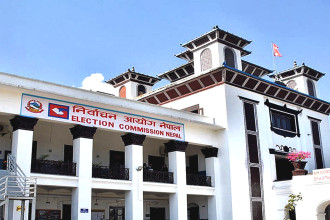
KATHMANDU: Federation of Nepalese Chambers of Commerce and Industry (FNCCI) has said the third-quarterly review of the monetary policy accepts problems of current economic situation, risk of bad loans, inflation, and high-interest rates. However, there is little hope that the market will be able to run immediately as adequate measures could not be adopted.
Nepal Rastra Bank (NRB) on Friday made public the third-quarterly review of monetary policy for the fiscal year 2022/23.
Issuing a press statement, FNCCI said, with reference to the relaxation of economic activities and decreasing ability of entrepreneurs to pay the interest on loans, the monetary policy review has partially given the facility to restructure and reschedule the loans within July 16, 2023. Likewise, it has given the facility to restructure and reschedule the loans related to hotels and restaurants, animal husbandry, and construction sector, and loans of Rs 50 million that have flowed to other sectors by the end of current FY. However, the productive sector is missing from the list, FNCCI pointed out.
Nepal Rastra Bank (NRB) has reduced the existing bank rate by one percentage point to 7.5%. Theoretically, this will decrease the interest rates. However, the possibility of immediate decrease in the interest rate on loans seems to be minimal as Nepal Bankers' Association has already decided to keep the interest rate unchanged for the coming months, FNCCI said.
Based on the data to be published by the National Statistics Office (NSO) through the quarterly review, arrangements have been made to provide re-loan facilities within the limits of the resources available in the fund so that the borrowers associated with the economic sector which has been experiencing negative growth for the last two quarters will get the facility.
Businesses related to industry, construction and business sector will get this facility. But as there is a possibility of placing the business sector on the negative list, FNCCI has demanded that this facility should also be provided to other sectors that have negative growth and are in trouble. The refinancing facility is expected to inject around Rs 50 billion into the market. However, the bankers have doubts that the re-loan amount will be drawn at once like last year.
Loans of short-term and working capital nature can be extended until mid-July for up to three months if the interest is regular. It is said that the bank cannot charge any compensation or fee for this.
Even though some provisions of the Working Capital Loans Guidelines, 2079 have been amended, the FNCCI has urged the central bank to review the provisions including maintaining zero arrears for seven days annually. FNCCI further suggested removing the 25% limit set on working capital loans.
The borrowers of microfinance institutions have been given facilities for restructuring and rescheduling on the basis of the needs of the related institutions in view of the difficulties being faced by them in repaying their loans. This will provide relief to small borrowers.
Internal remittances are not revealed in the quarterly review of monetary policy. Due to this, students, workers working in the construction sector, employees working in the informal sector, security personnel, small businessmenpersons and the general public are having difficulty in sending money.
The federation demanded that private sector's call for implementing policy arrangement to lower the interest rate of loans given in the productive sector than in other sectors be addressed as soon as possible.
Meanwhile, FNCCI has thanked NRB for at least partially addressing the former's suggestions through the review. The Federation has also drawn the attention of the central Bank to the fact that the facilities given are insufficient and not enough to boost the economy.
READ ALSO:
Published Date: May 14, 2023, 12:00 am
Post Comment
E-Magazine
RELATED B360 National





